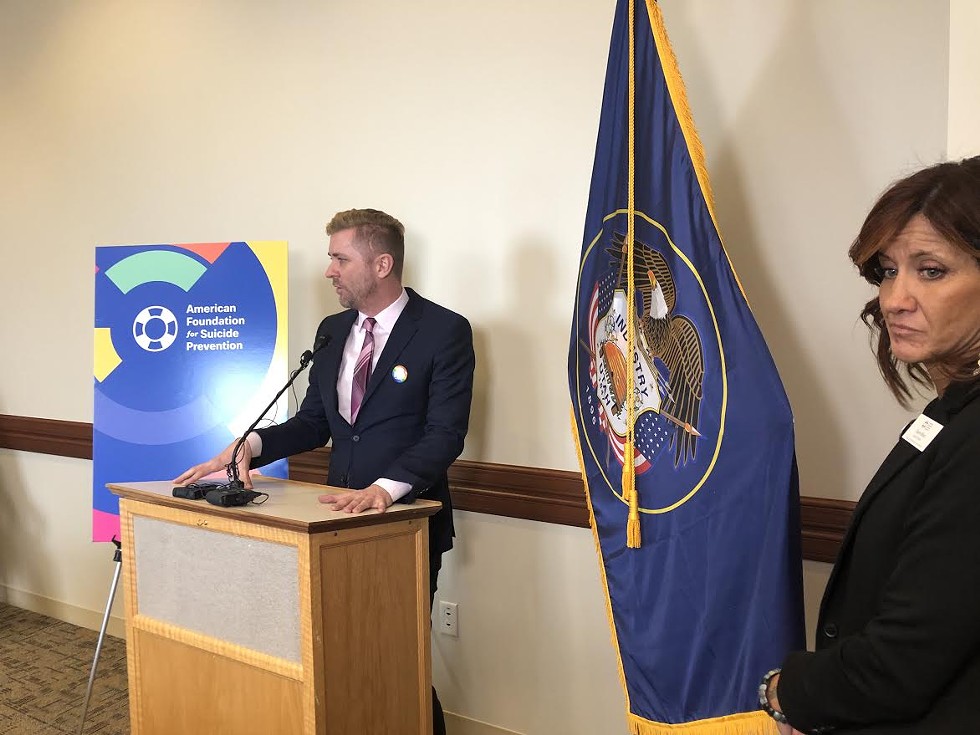Year
Family members, survivors and volunteers took to the Utah Capitol on Tuesday to support an alarmingly large group that often suffers in silence: Utahns who are contemplating suicide.
“What we’re doing is giving our volunteers a platform for them to meet with their representatives and tell them directly why suicide prevention matters to them,” Jessica Foard, secretary and public policy co-chair of the Utah chapter of the American Foundation for Suicide Prevention (AFSP), told City Weekly before her organization’s State Advocacy Day. “We just want them to feel like they have a voice up there on the Hill, and we’re working hard with our legislators to make sure smarter mental-health legislation is passed.”
According to a fact sheet provided by AFSP, suicide is the seventh-leading cause of death in the state, and the leading cause of death for Utahns between ages 15 and 24. Nationwide, the Beehive State’s suicide rate is ranked sixth highest.
Rep. Steve Eliason, R-Sandy, talked during the AFSP news conference about the “historic” session he and his colleagues had last year, passing eight bills related to suicide prevention and securing an “unprecedented” amount of ongoing funding for similarly related programs. “We’ll call that good,” Eliason said, “but this session is going to be better, if we have our way.”
One of the pieces of legislation Eliason sponsored this session, House Bill 17, would further educate gun-owners on the risks of not locking up their firearms. Before renewing their license, concealed-carry permit holders would be required to watch a short video on the importance of safe storage, “to try and communicate that key principle that that firearm that you own or purchased to protect your family with is most likely the firearm that will take the life of a family member,” Eliason said. “That can be avoided if you store it properly, and know the risk and address it.”
AFSP is championing bills this session that would identify people who might be suicidal and help connect them with services before it’s too late. Those include House Bills 58 and 209, which would compile data and gather information on overdose and opioid-related deaths, and temporarily remove a person’s firearms from their possession when they are experiencing a mental-health crisis. Eliason also discussed a number of bills he’s excited about, including one that would provide $42 million in ongoing funding so that school districts could increase the number of psychologists, social workers and therapists they have on staff, and the creation of a “victims of suicide reparations fund,” a program that would give money to families that have lost a loved one to suicide to cover costs incurred in the aftermath of the tragedy, like therapy, to process their trauma.
Foard said the legislative session is a crucial time to make the state a safer place for Utahns in desperate need of support and access to mental health services. “Through their legislation, we can save lives and bring hope to those affected by suicide,” she said.
Looking Ahead
Thanks to a federal holiday on Monday, AFSP’s news conference took place at the beginning of a truncated fourth week of this 2019 legislative session. Now that Prop 3 has been axed in favor of a law that provides a more limited expansion of Medicaid, lawmakers can turn their attention to other high-priority legislative goals like cutting taxes, despite Senate Republican leadership telling reporters Tuesday that state tax revenues are down $300 million.
Other controversial bills still on legislators’ to-do list include Rep. Cheryl Acton’s, R-West Jordan, abortion ban bill—which Acton changed from 15 to 18 weeks for “strategic reasons,” she told The Salt Lake Tribune—and legislation that would strengthen Utah’s hate crimes laws. The latter gained renewed import after an alleged hate-crime assault in Salt Lake City’s downtown over the weekend. The bill will get a committee hearing on Thursday.
Another debate to watch in the coming weeks is an as-yet unfiled bill that would ban conversion therapy, a psychologically harmful practice that attempts to change a person’s sexual orientation. Troy Williams, executive director of Equality Utah, did not mention the bill in his remarks at AFSP’s news conference, but he alluded to a big announcement on Thursday. “As you may know, in the gay community, we like a little drama,” Williams said, mentioning that he has been working with AFSP on an important piece of legislation “that we know will save lives.”


